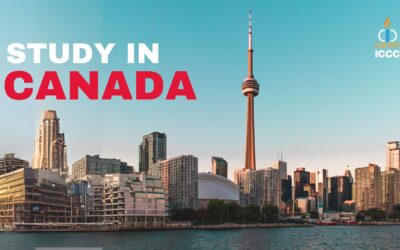Canadian Study Visa vs Study Permit
Every Canadian education aspirant gets perplexed over the terms “Study Visa vs. Study Permit” many a time. Interestingly, these terminologies are used interchangeably, and they often create skepticism about which is the correct term to bring into play when communicating with others or exchanging ideas about studying in Canada. This brief article outlines the core differences between these phraseologies.

Study Visa
In a comprehensible manner, a study visa is a TRV (Temporary Resident Visa), which allows an international student to travel to Canada to pursue the program at one of the Canadian educational institutions. It is the initial mandatory document that is required to be obtained before entering Canada and proceeding with a study permit. Students must understand that a study visa is a conditional authorization, as upon arrival at the Canadian port of entry, either at the airport or border, a foreign national with a study visa must meet the conditions stipulated by the Canada Border Services Agent (CBSA). Failing to meet the stipulations results in the denial of entry to Canada.
In addition, to obtain the study visa, foreign students must apply for it with other stipulated supporting documents at the Canadian embassy or consulate office in their native region, which requires a visa fee of CAD 150 on each application. Aspirants submit an application after receiving the Letter of Acceptance from the Designated Learning Institution (DLI) and arranging all necessary visa documents, such as academics, travel documents, proof of English language proficiency, LOA, financial means, a Statement of Purpose, and many other supporting documents to prove the genuineness of the student’s purpose of visiting Canada as an international student.

Study Permit
The study permit is a document that entitles the holder to pursue the chosen program at the Canadian institution, reside, and receive full-time and part-time employment; however, conditions apply. It has details about the student, such as the purpose of the visit to Canada, the name and level of the chosen program, the duration of the stay, its validity, the conditions of the work restriction, and so on. The final approval will be rendered by a border service officer by using the permit reference number, which is found in the “Letter of Introduction” sent by the visa officer at the time of initial visa approval at the Canadian embassy or consulate. More significantly, to receive the study permit at the border, there is no additional charge.
It is paramount to clearly understand and keep meeting the requirements to legally stay in Canada. In order to reside, students must be enrolled at the Designated Learning Institution (DLI), make progress towards their chosen field of study, adhere to the conditions annexed to the study permit, and undertake employment opportunities without jeopardizing the applied conditions; infringement of these conditions could lead the holder to receive a removal order from Canadian authorities. Thus, it is the responsibility of the student to inquire, consult, and research before making up their mind to study and settle in Canada.
What can ICCC do for you?
ICCC is led by a visionary man in the field who has decades of exposure and expertise when it comes to Canadian education from Nepal. To aid his long-term foresight, ICCC has been directly associated with the Regulated Canadian Immigration Consultant (RCIC), who is an authorized individual to advise, guide, and represent the client’s cases to the Canadian authorities to get the best possible outcome in their favor. Furthermore, the dedicated team of ICCC with ample experience in the field can turn an unforeseen dream into a reality with ease, and it can act as a bridge between the aspirations and achievements one intends to achieve in Canada.
Contact your nearest ICCC branch office today
We have branches in Kathmandu – Kamaladi, Kathmandu – Putalisadak, Kathmandu – Chabahil, Pokhara, Chitwan, Butwal, Jhapa, and Canada – Oakville.

We work hard to make the Canada Study Visa process simple and convenient for students. Our staff are available at all our branches during office hours. Alternatively, you can contact us through the LIVE CHAT option on the website. We have a wide range of career options for our students to study in Canada.








